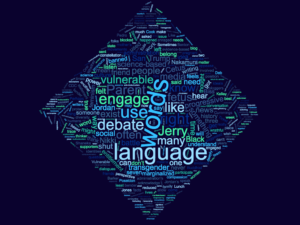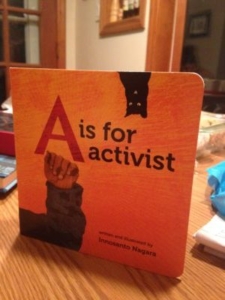We F**king Exist: Seven Writers on Seven Words
(do not erase)
based- (on the)
-evidence
transgender (adults) (children)
(are) vulnerable
(under this regime)
Diversity (is our) entitlement.
(Censorship is the) fetus (of fascism).
(This statement is) based-
(on the) -science
(of history).
~Melissa Benton Barker
* * *

Caravaggio: Saint Jerome Writing
When I (Meredith) conceptualized this collaborative essay, I was excited for the Lunch Ticket blog team to seize an opportunity and participate in current critical dialogues. The news about the seven supposedly banned words at the CDC had taken center stage and it seemed that in addition to being relevant to our mission, as writers, we could engage with this topic from a craft perspective. Language is how we understand the world, and in this country, right now, we need to position ourselves as protectors of language.
Note: The word “engage” will appear too many times in this writing. Engage can mean to promise, like to your sweetie; to connect with, participate in or get involved in. To engage is to bring something into position like parts of a machine, gears. We also use “engage” to talk about doing battle; we engage in combat. I asked the blog team at Lunch Ticket to collaborate, to engage with the following seven words: diversity, entitlement, evidence-based, fetus, science-based, transgender, vulnerable. The writers included here—Melissa Benton Barker, Shaneka Jones Cook, Tim Cummings, Jordan Nakamura, Jerry Parent, and Nikki San Pedro—got involved with, repositioned, and did battle with these words in prose and poetry.
* * *
Alt facts set to rule 2018
Who knows wtf they mean?
Titles meant entitlement
CEO, JD, landed gent
~Nikki San Pedro
* * *
The issue of the banned words surfaced as I thought deeply about my use of social media and how I allow it to shape my perspective. In a seminar at Antioch University Los Angeles (December 11, 2017), Eula Biss discussed protecting the “vulnerable state of the thinker” during the writing process. Biss doesn’t use social media and prefers to work out her thoughts about language through lengthy writing/thinking processes. As I planned this piece, I worried if my writing might be falling prey to the superficial, trend-driven media blitzing.
Fake news is an evidence-based fact
~Shaneka Jones Cook
 Jordan Nakamura posed some questions about when it is best to listen and when to speak. He wanted to make sure I was aware of the layers of complication around the reported banning of the seven words: that they may or may not have been banned, that probably the Trump administration suggested they not be used, or maybe the CDC has been metering its use of those words so as not to incite the administration. Reading Jordan’s email, I felt flushed. Had I fallen into the social media trap? Responded to fake news? Reflecting upon this now, I know that the instinct to react to this news was a desire to protect myself and my communities.
Jordan Nakamura posed some questions about when it is best to listen and when to speak. He wanted to make sure I was aware of the layers of complication around the reported banning of the seven words: that they may or may not have been banned, that probably the Trump administration suggested they not be used, or maybe the CDC has been metering its use of those words so as not to incite the administration. Reading Jordan’s email, I felt flushed. Had I fallen into the social media trap? Responded to fake news? Reflecting upon this now, I know that the instinct to react to this news was a desire to protect myself and my communities.
What needs to be said, for this time?
What needs to or would best be left unsaid, for this time?
Whom do I serve?
~Jordan Nakamura
As a Buddhist, I think often about whether something needs to be said and the many ways there are to understand a thing. But that same Buddhist practice urges me to protect the vulnerable and to use language as a tool in that struggle. It is not always clear when to speak and when to listen. Is anyone else afraid that we will listen ourselves right into total silence?
Here is a piece of Jordan’s assessment, sent to me after he had some time to think about it: “Outrage and mobilization against the administration’s anti-intellectualism, misogyny and transphobia are necessary efforts. Real effectiveness seems to only come from improvising in a dedicated relation to reality, to things we know or have every right to believe really happened. It’s true that whatever happened, if this was censorship or self-censorship or strategizing in response to the administration or a shifting toward the administration’s ideals or anything else, those ideals should be met with resistance.”
* * *
(Transgender) Blender, splendor, offender.
~Jerry Parent
This week, during one of many holiday gatherings, a good friend asked me: “Do you ever think you are too progressive?” “No way!” I yelled. I have circulated in progressive circles since my teen years and have often felt sort of moderate. My friend was questioning if our allegiance to certain language causes us to shut down dialogues with people who disagree with us. I’ve heard this claim frequently in the space left (but not that far left) of center over the past few years—that we go tit-for-tat about words and pronouns and we shut people down.
 The idea that language is used to exclude people has earned a place on the mantle of American culture. We saw it flaunt its ugly head when Trump and his supporters complained about “political correctness.” What I hear in those complaints is this country’s trouble with inclusivity and its vision of itself. I hear old bias surfacing. I hear language fed to people by right-wing politicians to counter neoliberal language (that was itself coopted from movements on the left being reduced to a few angry words). For many, civil rights, Black liberation, feminism, Black feminism, Latinx feminism, multiculturalism, queer organizing, identity politics—the struggles that have existed in my lifetime of forty-one years—merely boiled down to language enforcement.
The idea that language is used to exclude people has earned a place on the mantle of American culture. We saw it flaunt its ugly head when Trump and his supporters complained about “political correctness.” What I hear in those complaints is this country’s trouble with inclusivity and its vision of itself. I hear old bias surfacing. I hear language fed to people by right-wing politicians to counter neoliberal language (that was itself coopted from movements on the left being reduced to a few angry words). For many, civil rights, Black liberation, feminism, Black feminism, Latinx feminism, multiculturalism, queer organizing, identity politics—the struggles that have existed in my lifetime of forty-one years—merely boiled down to language enforcement.
We never changed our understanding of ourselves as subjects of history. We don’t know how to do this.
(Science-based) Defiance-based
~Jerry Parent
When we decide, compassionately, not to shut someone down, but to explain why we use the language we use, we might have a transformative conversation. At the very least, if both parties engage earnestly, there will be an exchange that leaves a trace. If we are dismissive, we leave a different trace. Sometimes we say nothing because we know the other human is so defensive that they can’t hear.
I have done all three.
While linguists attempt
The impossible
~Jerry Parent
 The power of language was epitomized by people’s reaction to Black Lives Matter. The massive reactions to that affirmative statement, those three words, in that order showed where we each stood as Americans. People felt enraged and excluded or powerfully motivated. I was in awe of those words. By affirming that Black lives matter, the fact that our society acts otherwise became immediately apparent. Those words are so simple, so true, yet they require constant defense in our culture.
The power of language was epitomized by people’s reaction to Black Lives Matter. The massive reactions to that affirmative statement, those three words, in that order showed where we each stood as Americans. People felt enraged and excluded or powerfully motivated. I was in awe of those words. By affirming that Black lives matter, the fact that our society acts otherwise became immediately apparent. Those words are so simple, so true, yet they require constant defense in our culture.
* * *
The big thing on media in the days leading up to Christmas was a supposed feud between Cornel West and Ta-Nehisi Coates. One morning, as I cuddled my phone, I read an article in The Boston Review by Robin D. G. Kelley on the West/Coates issue. Kelley asks us to engage more deeply in the conversation between the two writers rather than to make sport of it. He encourages debate. The word “debate” keeps coming up this week. But debate in our culture often means that I have to debate my right to exist as a queer person and for the right for so many others to exist.
 It felt like that on Facebook with my mother’s former coworker, Deb. After the Trump win, Deb engaged in battle with the same slippery weapons used by Donald Trump and his supporters. She stated falsehoods as facts, completely dismissed marginalized populations and progressive social movements and insisted that this year has been “great.” She bragged about having written Paul Ryan in on the ballot. She never entertained the idea that the goal of policy could be that all humans are treated with kindness. She blocked people who did not agree with her and she almost never responded directly to questions. My mother’s friends, my family, and my partner engaged her in “debate” regularly. My mother finally blocked her due to her mean-spiritedness towards our family and friends. One woman lamented that this would be an end to debate. Like my friend had suggested, this commenter thought we were “too progressive.”
It felt like that on Facebook with my mother’s former coworker, Deb. After the Trump win, Deb engaged in battle with the same slippery weapons used by Donald Trump and his supporters. She stated falsehoods as facts, completely dismissed marginalized populations and progressive social movements and insisted that this year has been “great.” She bragged about having written Paul Ryan in on the ballot. She never entertained the idea that the goal of policy could be that all humans are treated with kindness. She blocked people who did not agree with her and she almost never responded directly to questions. My mother’s friends, my family, and my partner engaged her in “debate” regularly. My mother finally blocked her due to her mean-spiritedness towards our family and friends. One woman lamented that this would be an end to debate. Like my friend had suggested, this commenter thought we were “too progressive.”
What I said to my friend, that night, after switching from wine to whiskey, was that there are some folks with whom I can’t debate because we have no common language. I lied. I just don’t have the energy to get there.
And then you’ve got a lot to say
But better use it carefully
~Tim Cummings
 Progressives have lost some of the spirit of debate. Among ourselves we tend to shut one another down when someone uses the wrong word. And we need to work on that. But I want to acknowledge here that it is difficult work when the words are actual signifiers of our existence, like pronouns, like “transgender.” Like the basic idea that marginalized identities need to matter. It feels we are engaging in battle on all sides and perhaps gaining no new territory. Nikki San Pedro’s words ring in my ears:
Progressives have lost some of the spirit of debate. Among ourselves we tend to shut one another down when someone uses the wrong word. And we need to work on that. But I want to acknowledge here that it is difficult work when the words are actual signifiers of our existence, like pronouns, like “transgender.” Like the basic idea that marginalized identities need to matter. It feels we are engaging in battle on all sides and perhaps gaining no new territory. Nikki San Pedro’s words ring in my ears:
Trading diversity for adversity
Pity. A gritty city by committee
Neverending fender bender
Engendering transgender return-to-sender
Making a fetus meet us
prior to the treatise
Vulnerable is honorable
Pieces in the rubble
Coming together to weather the whips, the leather
Whether or not science-based
What does it mean for me and my community when the United States Department of Health and Human Services removes the page with support services for LGBT families? It certainly feels like a “neverending fender bender,” or some eternal gridlock when those in power refuse to acknowledge particular identities. How can we budge an inch when you won’t allow us to exist? Sometimes it feels like “dialogue” means I must convince someone that I or other, more marginalized folks, exist.
(Vulnerable) Venerable
~Jerry Parent
When I was fifteen, I had an abortion. A fetus was aborted and evidence shows that I would have struggled more if I had chosen to have that baby because single mothers are more vulnerable. The guy who got me pregnant, got at least two other women pregnant in the span of three years. He might have benefitted from science-based sex education. I wish we had all held him more accountable to use protection. I wish he had placed more value on our bodies.
Oh, Splendor;
You blend and render,
Sweet, white burgundy.
While your manifest-based
Physiology is the same,
Others shout out their defiance-
Based solely in their god
Filled science.
~Jerry Parent
 I thought about Eula Biss and the “vulnerable state of the thinker.” If we took more advantage of this, would we have an easier time talking to one another? Would we come to similar conclusions about freedom and simply disagree about how to get there? I need to admit that I am frustrated with the “we have to talk to the other side” approach. Even if it is true, it is so often reduced to a trite mandate, something much less than having to say over and over again, “I fucking exist!” Followed by an eloquent, easy to understand story that perfectly incites the listener into deep compassion. And what if they don’t have any compassion?
I thought about Eula Biss and the “vulnerable state of the thinker.” If we took more advantage of this, would we have an easier time talking to one another? Would we come to similar conclusions about freedom and simply disagree about how to get there? I need to admit that I am frustrated with the “we have to talk to the other side” approach. Even if it is true, it is so often reduced to a trite mandate, something much less than having to say over and over again, “I fucking exist!” Followed by an eloquent, easy to understand story that perfectly incites the listener into deep compassion. And what if they don’t have any compassion?
* * *
Entitlement: Resentment, entrapment; your right to something after you were spent; commitment, bride & lent, tide & bent, side-eye sent. …
~Meredith Arena
* * *
In his poem, Jerry Parent rhymed fetus with Cetus. Cetus is the constellation that depicts the Greek Sea Monster who was slain by Perseus before it could kill Andromeda, who had been chained to a rock by her parents to appease a wrathful Poseidon. Poseidon had been enraged at their boastful descriptions of Andromeda’s beauty. Perhaps Cetus can remind us that women—especially poor and working class women, especially brown and black women—are often the victims of wrathful male thinking; of gods we feel we should appease, before we care for the lives right here in front of us.
 Jordan writes: “How many times has ‘fetus’ really been a stand-in for a buried discussion on the definition and the limits of humanity, property, power, and what (if any) is the seam between life and choice, and what are the manifold dimensions in between them that explode a binary?”
Jordan writes: “How many times has ‘fetus’ really been a stand-in for a buried discussion on the definition and the limits of humanity, property, power, and what (if any) is the seam between life and choice, and what are the manifold dimensions in between them that explode a binary?”
We often call the Cetus constellation a whale. Whales have a much more sophisticated way of communicating than humans. Their song is in accordance with the physics of water, can travel vast distances. Perhaps this is a fanciful stretch. We know language matters. It is how we view ourselves. Do we know that words belong to us? The way we belong to history. The way we belong to ourselves and each other?
Whether or not science-based
is laughed at in the face
Evidence-based: a disgrace?
Are we misplaced?
Mistimed?
Did we lose the race?
~Nikki San Pedro
Contributors:
Meredith Arena, Blog Editor
Melissa Benton Barker, Managing Editor
Shaneka Jones Cook, Interview Team and Guest Blogger
Tim Cummings, YA Assistant Editor and Blogger
Jordan Nakamura, Poetry & Visual Art Assistant Editor and Graphic Design Team
Jerry Parent, Flash Prose Editor and Blogger
Nikki San Pedro, Creative Nonfiction Editor and Blogger
Editor’s note:
Dear Lunch Ticket Readers,
We publish original essays each Friday. Occasionally we bring you a collaboration, like in the aftermath of the 2017 election, in which former blog editor Mary Birnbaum wrote: “What we have always known is more true than ever: that there is no single story. … Writing, like all communication, is a way forward. So we proceed together. One word after another. After another. After another.” It is in that spirit that we publish this collaborative piece today. As the journal welcomes a new editor and staff for 2018, this is the final piece I will proudly publish here. I’m thrilled to share the voices of these writers and activists with you one more time as we find our way forward, together.
~Katelyn Keating, Editor in Chief of Issues 11 & 12





